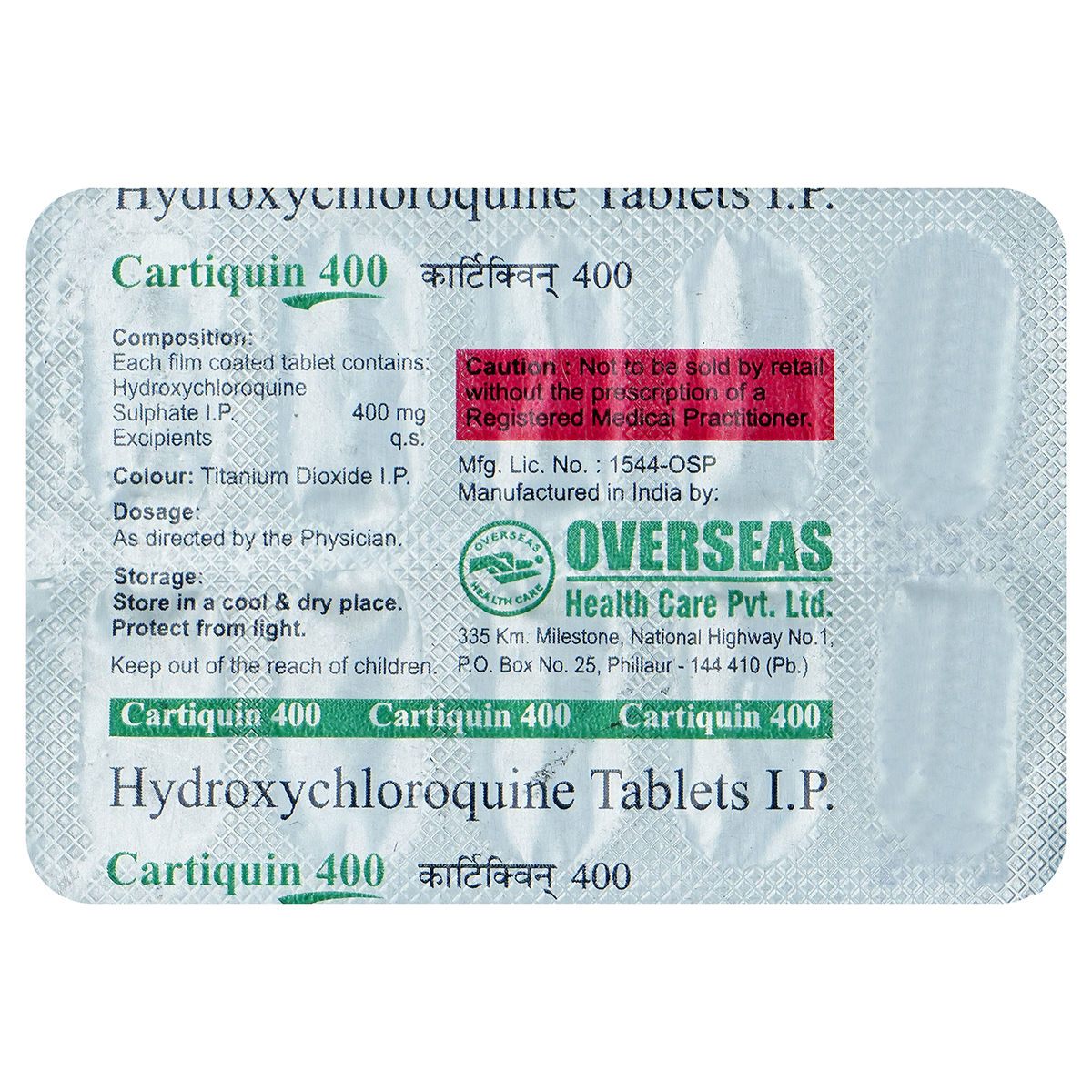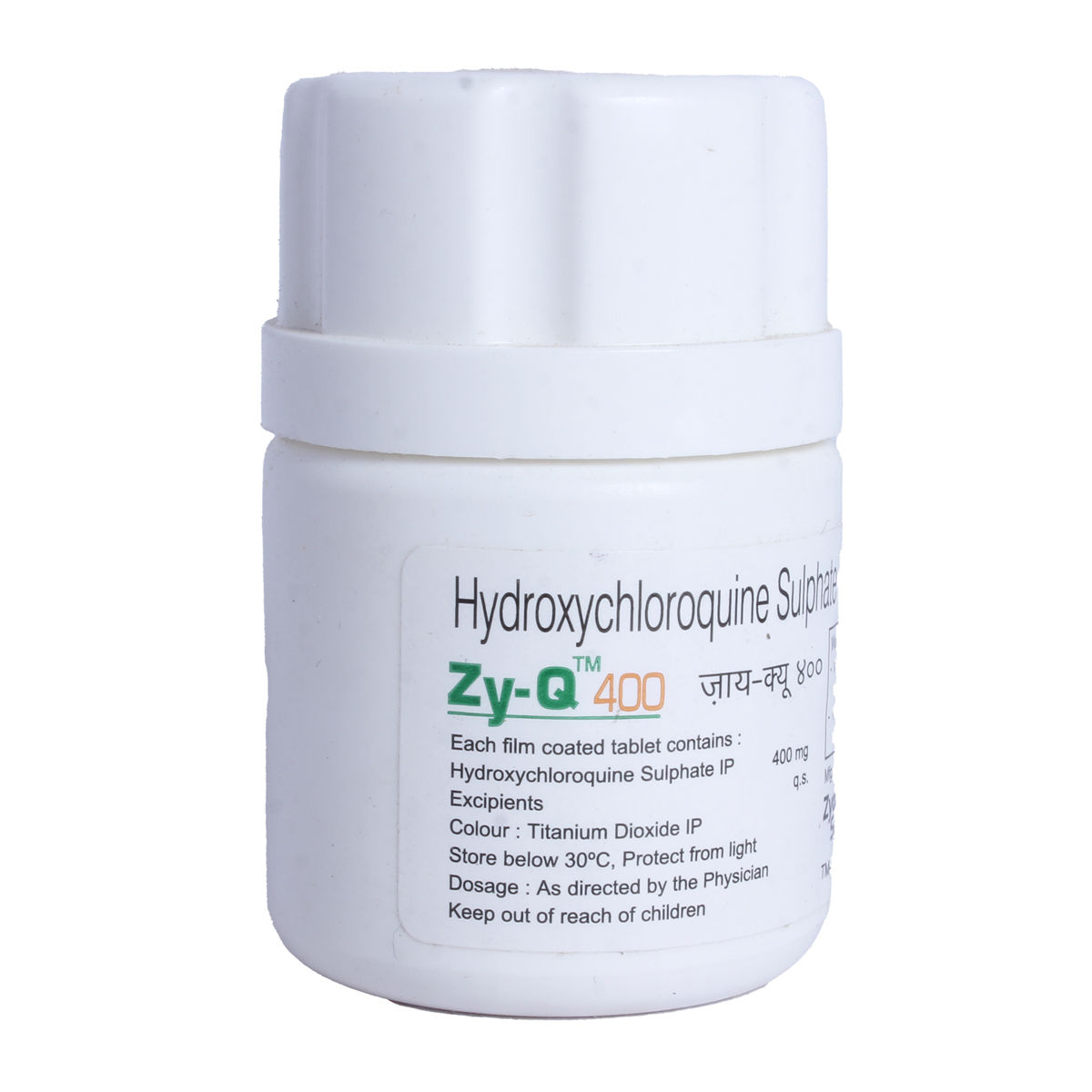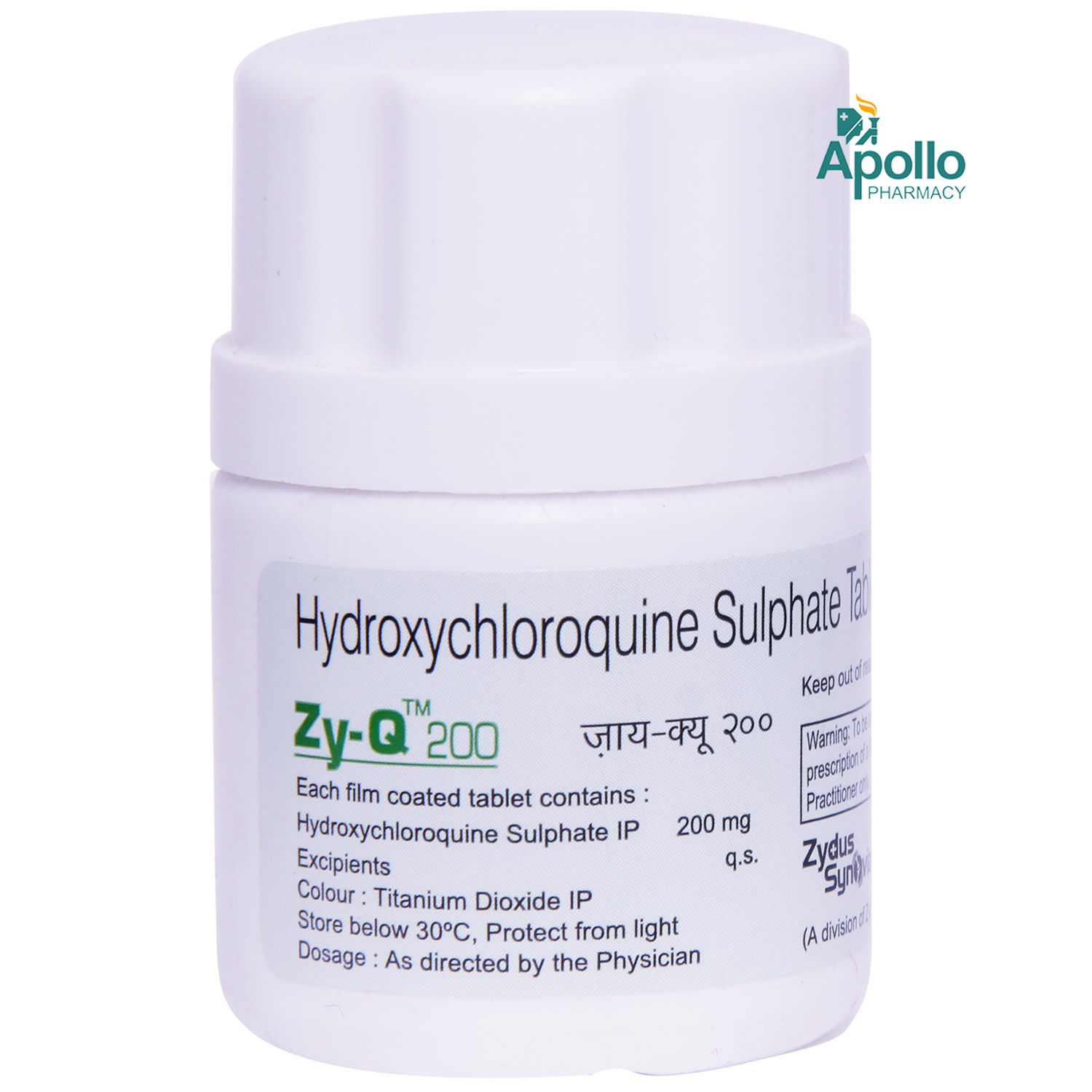Hydroxychloroquine
About Hydroxychloroquine
Hydroxychloroquine belongs to the class of 'anti-inflammatory drugs.' It has various medical uses, including treatment for type 2 diabetes mellitus, acute or chronic rheumatoid arthritis, dyslipidaemia (abnormally elevated cholesterol levels), systemic and discoid lupus erythematosus (autoimmune disease), polymorphous light eruption (a rash caused by sun exposure), and malaria.
Hydroxychloroquine contains Hydroxychloroquine, an anti-inflammatory drug. For diabetes, it works by improving insulin sensitivity and increasing insulin secretion. In rheumatoid arthritis, Hydroxychloroquine acts as a mild immunosuppressant and disease-modifying anti-rheumatic agent and inhibits the production of rheumatoid factor. It also decreases the severity of skin lesions in systemic and discoid lupus erythematosus. In malaria, it works by increasing the concentration of a toxic compound in the parasite that leads to its death.
Take this medicine as prescribed by a doctor. Hydroxychloroquine may cause common side effects like blurred vision, abdominal pain, nausea, vomiting, loss of appetite, diarrhoea, headache, mood changes, skin rashes, itching, sensitivity to light, and pigmentation disorders. These side effects are not familiar to everyone and may vary individually. If you notice any side effects that are not manageable, please consult your doctor.
Before taking Hydroxychloroquine, please inform your doctor if you are allergic to medicines, liver/kidney/heart diseases, gastrointestinal problems, blood disorders, and brain-related problems. Pregnant and breastfeeding women should consult their doctor before starting Hydroxychloroquine. Hydroxychloroquine may cause blurred vision; hence do not drive or operate machinery until you feel better. The safety and efficacy of Hydroxychloroquine have not been established in children; please seek medical advice for more information.
Uses of Hydroxychloroquine
Medicinal Benefits
Hydroxychloroquine has diversified medical uses and works by reducing inflammation in people with autoimmune diseases. It helps treat type 2 diabetes mellitus and autoimmune conditions like rheumatoid arthritis, systemic lupus erythematosus, and malaria. For diabetes, it works by improving insulin sensitivity and increasing insulin secretion. In rheumatoid arthritis, Hydroxychloroquine acts as a mild immunosuppressant and disease-modifying anti-rheumatic agent and inhibits the production of rheumatoid factor. In malaria, it works by increasing the concentration of a toxic compound in the parasite that leads to its death. Hydroxychloroquine is an anti-thrombotic and anti-platelet agent that helps reduce abnormally elevated cholesterol levels. It also decreases the severity of skin lesions in systemic and discoid lupus erythematosus.
Directions for Use
Storage
Side Effects of Hydroxychloroquine
- Blurred vision
- Abdominal pain
- Nausea
- Vomiting
- Loss of appetite
- Diarrhoea
- Headache
- Mood changes
- Skin rashes
- Itching
- Sensitivity to light
- Pigmentation disorders
Drug Warnings
Before using Hydroxychloroquine, inform your doctor if you have recently used any prescription and non-prescription medications. Keep your doctor informed of your medical history before starting Hydroxychloroquine. Please seek medical advice if you are pregnant or breastfeeding before taking Hydroxychloroquine. This medicine may cause blurred vision; hence drive or operate machinery only when you are alert and have clear vision. Avoid alcohol consumption while being treated with Hydroxychloroquine. Safety and efficacy of Hydroxychloroquine have not been established in children.
Drug Interactions
Drug-Drug Interaction: Hydroxychloroquine may interact with anti-cancer drugs (tamoxifen), heart-related medicines (digoxin, amiodarone), anti-diabetic drugs (insulin), anti-malarial drugs (halofantrine, mefloquine), antibiotics (moxifloxacin, azithromycin, penicillamine), immunosuppressants (ciclosporin), heartburn medicines (cimetidine), antipsychotics (amisulpride, quetiapine), fits medicines, and anticoagulants.
Drug-Food Interaction: Avoid alcohol consumption while using Hydroxychloroquine.
Drug-Disease Interaction: Before using Hydroxychloroquine, let your doctor know if you have any medical history of liver or kidney problems, heart diseases, diabetes, G-6-PD (glucose-6 phosphate dehydrogenase) deficiency (a genetic enzyme deficiency), high blood pressure, serious stomach or gut problems, nervous system problems, psoriasis, porphyria (a blood disorder), history of heart attack (myocardial infarction), electrolyte imbalance, fits, damaged retina or vision problems, and allergic reactions to medicines.
Drug-Drug Interactions Checker List:
Safety Advice

Alcohol
cautionAvoid alcohol while using Hydroxychloroquine since it can worsen your side effects and may interfere with the working of the medicine.

Pregnancy
unsafeHydroxychloroquine is not recommended during pregnancy. Please seek medical advice if you are pregnant or planning to conceive.

Breast Feeding
unsafeHydroxychloroquine is not recommended during lactation since it is excreted into the breast milk. Please consult your doctor before starting Hydroxychloroquine if you are a breastfeeding mother.

Driving
cautionHydroxychloroquine may cause blurry vision affecting your ability to drive or operate. In such cases, do not drive or operate machinery until you are alert and have a clear vision.

Liver
cautionLet your doctor know if you have any history of liver diseases before using Hydroxychloroquine.

Kidney
cautionLet your doctor know if you have any history of kidney diseases before using Hydroxychloroquine.

Children
cautionSafety and efficacy of Hydroxychloroquine have not been established in children; please seek medical advice for more information.
Habit Forming
Diet & Lifestyle Advise
- Maintain a fibre-rich diet and include fruits, vegetables and whole grains to maintain your blood glucose levels.
- Eat at regular intervals.
- Keep a check on your weight and exercise regularly to keep your heart healthy.
- Notice and manage the early symptoms of high/low blood sugar levels.
- During malarial fever, the patient may experience appetite loss. In such cases, drink glucose water, fresh fruit juices, and coconut water.
- Include high-fibre foods like green leafy vegetables and fruits to aid digestion.
- Avoid or limit the intake of alcohol and caffeine.
Special Advise
- Let your doctor/laboratory staff know that you are taking Hydroxychloroquine if you undergo medical tests.
- While being treated with Hydroxychloroquine, your doctor may suggest ECG (electrocardiogram) to monitor your heart health.
- Your doctor may also suggest tests for blood cell counts (during prolonged therapy) and liver and kidney function tests.
Patients Concern
Disease/Condition Glossary
Diabetes mellitus: It is also known as adult-onset diabetes, is a metabolic disease that causes high blood sugar levels. It occurs when the insulin (a hormone produced by the beta cells of the pancreas) is resistant in breaking the glucose to produce energy (insulin resistance), or the pancreas (an organ behind the stomach) produces little or no insulin at all. This disease mostly occurs in people above 40 years but can also occur in childhood based on the risk factors.
Malaria: It is a life-threatening disease caused by parasites that enter the body through a mosquito's bite. This disease usually occurs when an Anopheles mosquito (infected with the parasite 'Plasmodium') bites a healthy individual and transfers the parasite into the bloodstream. Symptoms include chills, high fever, profuse sweating, headache, nausea, vomiting, abdominal pain, diarrhoea, anaemia, muscle pain, convulsions, coma, and bloody stools.
Rheumatoid arthritis: It is an autoimmune disease (the body's immune system attacks its tissue), leading to joint pain and damage. Symptoms of rheumatoid arthritis include pain, swelling, stiffness, deformities, and loss of joint function.
FAQs
Hydroxychloroquine is used to treat type 2 diabetes mellitus, acute or chronic rheumatoid arthritis, dyslipidaemia (abnormally elevated cholesterol levels), systemic and discoid lupus erythematosus (autoimmune disease), polymorphous light eruption (a rash caused by sun exposure), and malaria.
Hydroxychloroquine contains Hydroxychloroquine, an anti-inflammatory drug that reduces inflammation in people with autoimmune disorders. Hydroxychloroquine improves insulin sensitivity in diabetes and has a hypoglycaemic effect. It is a disease-modifying anti-rheumatic agent that inhibits the production of rheumatoid factor in rheumatoid arthritis. It also decreases the elevated cholesterol levels in the body and reduces the risk of cardiovascular diseases. Hydroxychloroquine is also an anti-malarial drug that treats malaria by increasing the concentration of a toxic compound in the parasite that leads to its death.
Inform your doctor in advance if you have any liver or kidney problems, heart diseases, diabetes, G-6-PD (glucose-6 phosphate dehydrogenase) deficiency (a genetic enzyme deficiency), high blood pressure, serious stomach or gut problems, nervous system problems, psoriasis, porphyria (a blood disorder), history of heart attack (myocardial infarction), electrolyte imbalance, fits, and allergic reactions to medicines.
Hydroxychloroquine may cause drug-induced retinopathy (disease related to the retina) when taken more than recommended. You may not be advised Hydroxychloroquine by your doctor if you have vision changes or damage to your retina. If the doctor has prescribed you this medicine knowing your medical history, you may be further advised to take ophthalmological examinations, including visual acuity, ophthalmoscopy, fundoscopy, and visual field tests. If there are any changes in these examinations, you may be asked to discontinue the treatment.
Hydroxychloroquine may sometimes affect mental health and cause problems like irrational thoughts, anxiety, hallucinations, feeling confused or feeling depressed, including thoughts of self-harm or suicide. Hence, you should speak to your doctor before using Hydroxychloroquine.
The side effects of Hydroxychloroquine include headache, blurred vision, stomach pain, nausea, vomiting, and diarrhoea. If these side effects persist or worsen, please consult your doctor.
Hydroxychloroquine is currently under study in several clinical trials (research studies in human beings) to treat patients with COVID-19 (the illness caused by the novel coronavirus) and to prevent the spread of new coronavirus infection. Hydroxychloroquine has shown some activity against the novel coronavirus in laboratory studies (in vitro studies). However, to determine whether Hydroxychloroquine is effective against the novel coronavirus, further evidence is needed.
The use of Hydroxychloroquine for prevention of novel coronavirus infection has been recommended by the national task force for COVID-19 (constituted by ICMR). It is only for use in certain high-risk populations (ie people at high risk of exposure to the virus) or emergency situations. It can be used for prophylaxis in case of asymptomatic healthcare workers involved in the care of confirmed or suspected cases of COVID-19 and asymptomatic household contacts of laboratory-confirmed cases.
No, we do not need to maintain a stock of Hydroxychloroquine. If you think you may have the new coronavirus infection, consult a doctor immediately and follow their advice strictly. Do not self-administer Hydroxychloroquine. Remember that it should be taken only if prescribed by a doctor.
Your doctor will prescribe the dose and duration of Hydroxychloroquine. Follow your doctor’s instructions strictly.
Hydroxychloroquine should be taken as advised by the doctor. Take it with a meal or glass of milk to prevent nausea and stomach upset. Swallow it as whole. Do not crush, break or chew it.
If someone becomes symptomatic or shows symptoms of novel coronavirus such as dry cough, high fever, difficulty in breathing or tiredness while taking Hydroxychloroquine, they should consult their doctor immediately. The doctor will recommend if they require isolation or if they need to get tested for the novel coronavirus. They need to follow all the instructions given by the doctor.
Hydroxychloroquine may take a few weeks or months to show improvement in your symptoms of rheumatoid arthritis or other autoimmune diseases. However, it is important that you be patient and keep taking it regularly. In the meanwhile, your doctor may prescribe some additional medications to provide temporary relief from the symptoms.
Before starting treatment with Hydroxychloroquine, you must get an eye test and it should be repeated every12 months. Additionally, your doctor may recommend routine checks for your blood counts (CBC) and liver function test (LFT). If any abnormality is detected, your doctor may discontinue Hydroxychloroquine.
Hydroxychloroquine contains Hydroxychloroquine, an anti-malarial drug with anti-inflammatory and immunomodulatory properties. It is neither an opioid, nor a painkiller nor a steroid. Hydroxychloroquine increases the concentration of a toxic compound in the parasite that leads to its death. It reduces inflammation in people with autoimmune disorders. It is a disease-modifying anti-rheumatic agent that inhibits the production of rheumatoid factor in rheumatoid arthritis.
Yes, you may take ibuprofen with Hydroxychloroquine as there are no interactions found between them. However, always please consult your doctor before taking other medicines with Hydroxychloroquine.
If you stop taking Hydroxychloroquine without doctor’s consultation, your illness may worsen. Therefore, even if you start feeling better, do not stop taking Hydroxychloroquine without first consulting your doctor.
Yes, you need to be careful while using Hydroxychloroquine if you are diabetic as it may lower your blood glucose levels to dangerous levels so much resulting in loss of consciousness (severe hypoglycemia). Make sure to monitor your blood glucose levels regularly and if it begins to drop, contact your doctor immediately. Your doctor may change the doses of your anti-diabetic medications as per your blood glucose levels.
Yes, you may take Hydroxychloroquine but maintain a gap of minimum 4 hours between Hydroxychloroquine and antacid. If this gap is not maintained, then the antacid may interfere with the working or absorption of Hydroxychloroquine. Thereby, you may not experience the full benefits of Hydroxychloroquine.








